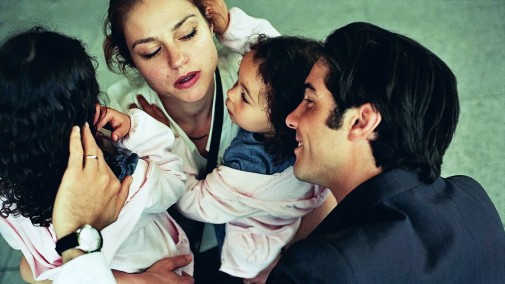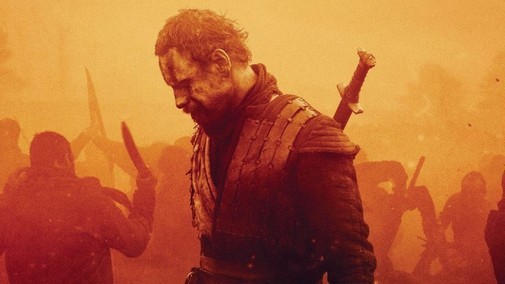Spike Lee's illustrious jury will hand out its prizes Saturday night. Friday was still full of screenings, however, including the last two premieres in the Main Competition. Justin Kurzel's Nitram has generated some controversy, purporting, as it does, to tell the story of the man responsible for the deadliest mass shooting in Australian history. To extend cinematic empathy, or even a gesture of exploitation, towards such a figure is bound to cause a polemic. The other film to screen on this last competitive day of Cannes 2021 was Joachim Lafosse's The Restless, the story of a Belgian family dealing with the struggles brought upon by bipolar disorder. To celebrate the event, we'll take a look at two previous tales of killers from these filmmakers. One is a mythic warrior, haunted by the carnage he commits. The other, a real-life mother who did something unthinkable…
Like many of Shakespeare's most famous plays, especially the tragedies, Macbeth has been adapted numerous times to the big screen. Welles, Kurosawa, Polanski, Tarr are just some of the auteurs who took their chances with the text. Maybe because of this wealth of options, fidelity to the original material seems beside the point, disappointing even. If an artist isn't willing to bend the play out of shape, find new possibilities within its Scottish tale, what's the point of even filming a new Macbeth? While purists were incensed, Justin Kurzel's 2015 adaptation remains one of the gutsiest Shakespearean films of recent vintage. Fearless to the nth degree, the movie even reconfigures character motivations, raising a shadow of parental grief over its doomed protagonists.
Taking this idea and running with it, Michael Fassbender and Marion Cotillard make the Macbeth couple into a swirling storm of psychological damage, renouncing the Bard's allegory of power, embracing a study of trauma and obsession. Intoxicated by twisted desire, there is enticing brutality to their acting. Mumbling their way through the dialogue with not a care in the world for iambic pentameter, the duo reveals heretofore unexplored possibilities of the roles. There's fragility in Fassbender's descent into bellicose madness, a hint of tenderness to Cotillard's Lady Macbeth. Her final scene is a daring interpretation, diluting guilt until it becomes feral, abstract, unfathomable.
Despite such florid character work, it's a film dominated by sensual stimuli, sounds and images full of fire and fury. The scenes that bookend this formalist Macbeth take the approach to extremes, reducing the world with a muddy undefinition, the air thick with mist, ears ringing from the heady mix of monstrous score paired with explosive sound effects. The cries of dying men become like a castle wall, heavy, solid, falling unto the spectator and crushing them to the point of pulpy mess. Shakespeare's writing for Macbeth is positively obsessed with atmospheric details, so Kurzel's vision isn't that much of a betrayal. Instead, it's more of a feverish experiment to see how visceral one can make this oft-retold story of corruption.
Streaming on Prime Video and Kanopy. You can also rent it on many platforms.

OUR CHILDREN (2012)
In 2007, Belgium was shocked by a heinous crime. A mother had killed her five children and, having survived an attempted suicide, was then sentenced to life in prison. It's difficult to imagine what circumstances could lead someone to such actions, what's behind this great tragedy. Fictionalizing the news story, Joachim Lafosse doesn't necessarily try to defend his character's actions, nor is he interested in exploring her interiority. Instead, the Belgium filmmaker creates a study of external pressures weighing down on people, corroding fragile psyches from which the camera is consistently distant. Lost somewhere between compassion and fascination, Our Children is a curiously opaque piece of cinema, so intent to avoid tabloid-ready melodrama, it risks alienation.
Reuniting after the success of A Prophet, Tahar Rahim and Niels Arestrup play the lead's husband and controlling father-in-law. While the younger actors explore a register of souring romance, gradually festering a loving husband into a paragon of cruel negligence, Arestrup takes a more minimalistic approach. As if embodying the concepts of patriarchal oppression and post-colonial malaise, the aged thespian quietly insinuates himself into the narrative, shocking for how subtle he allows himself to be. The paternalistic figure emerges as an asphyxiating force through persistent reticence and the film's lightning-paced ellipses, crushing everything that opposes his rule over the domestic realm. Still, the true star, besides Sophie Vercuysse's editing, is Émilie Dequenne in the principal part.
Years after her much-heralded performance in the Dardenne's Rosetta, the Belgium actress delivers a tour-de-force that is more surprising for how closed-off it ends up being. Continuously chastised for her tiredness, growing anxieties, and maternal depression, Dequenne's modern Medea rarely allows herself to express what goes on inside. Only alone, listening to an inane pop ballad, does her composure come falling down. From smiley singing to a wreck of sobs, she's a crumbling monument of fractured motherhood. As we follow her through an odyssey of ever-increasing pressures and perpetually dwindling autonomy, we might never understand the character's ultimate carnage. Nevertheless, Dequenne makes us feel her pain.
Streaming on Tubi, Kanopy, Fandor, and MUBI. You can also rent it on many platforms.
Any last bets on which filmmakers will be victorious at tomorrow's Closing Ceremony?
